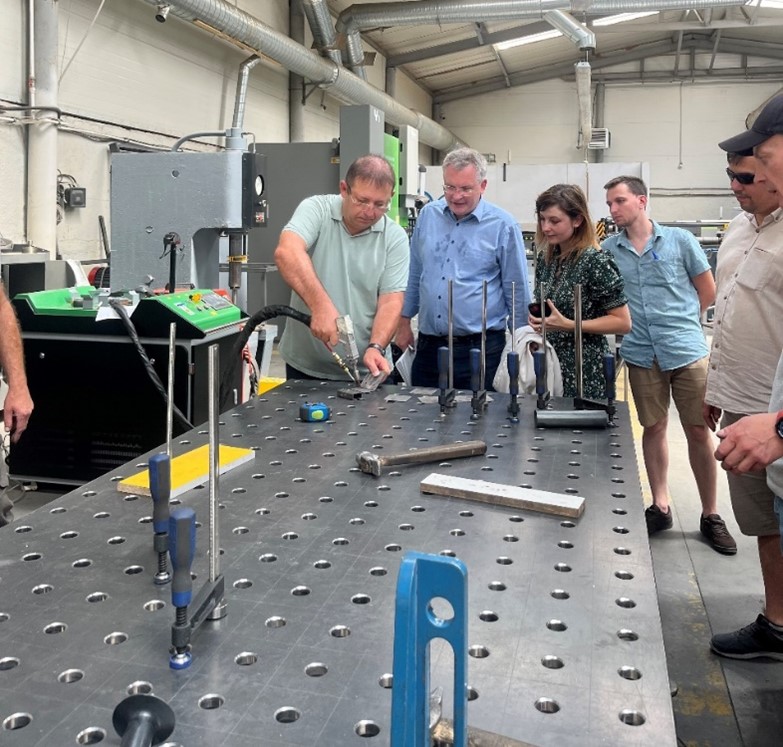Monicol
July represented an important month for assessing the experience of RECP Demonstration Companies in the Republic of Moldova. Between 10-14 July 2023, when a UNIDO mission was carried out to engage with national stakeholders and beneficiaries, the team also benefited from bilateral engagements with some of the companies that underwent RECP visits and assessments to develop dedicated RECP action plans.
As a bedrock principle, Resource Efficient and Cleaner Production (RECP) is a methodology based on preventive environmental strategies that help processes, products, and services increase efficiency and reduce risks to humans and the environment. Hence, RECP can support industries to develop and implement sustainability strategies based on their production, capacity, and individual needs.
The first company visit took place in Nimoreni, the headquarters of Monicol. Established in 2001 by Dumitru Vicol (an entrepreneur with over 30 years of managerial experience), the company produces high-quality dried fruits (including walnuts, prunes, cherries, pears, apples, tomatoes), as well as alcoholic beverages, which are shipped to national and international customers (in over 20 countries). Monicol is also one of the leading wholesale and retail suppliers of organic and conventional walnuts/walnut kernels and dried plumbs in the country.
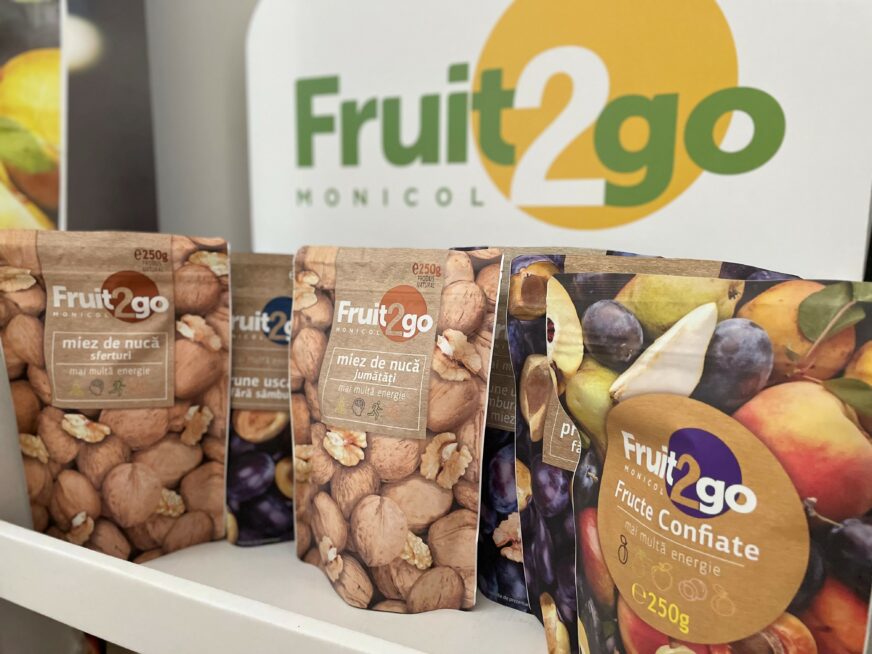
Mirrored by their excellent quality and competitive prices, Monicol’s products are exported to most European countries (such as Austria, Denmark, France, Germany, Latvia, Lithuania, Netherlands, Poland, Romania, Sweden, Switzerland, the UK etc.) as well as to China, Singapore, and the USA. The raw materials (walnuts and fresh fruits) are mostly grown in the company’s own orchards. The production is done in specialized workshops for production of dried fruits , including the walnuts processing , and the cold storage.
To obtain the highest quality, modern technologies and equipment are employed (optical and laser sorting machines). When it comes to taste and keeping the high quality of products for a longer period, in summertime, Monicol stores its fruits in a refrigerator at a constant temperature. Currently, the company also enjoys several certifications in accordance with the International Featured Standards Food, BRC Food, and Kosher Standards. Its organic products are also certified in accordance with the European Union and USDA Organic labels, as well as BioSuisse and KRAV standards. In addition, Monicol is a member of Business Social Compliance Initiative, and the Sedex/Smeta social responsibility organizations.
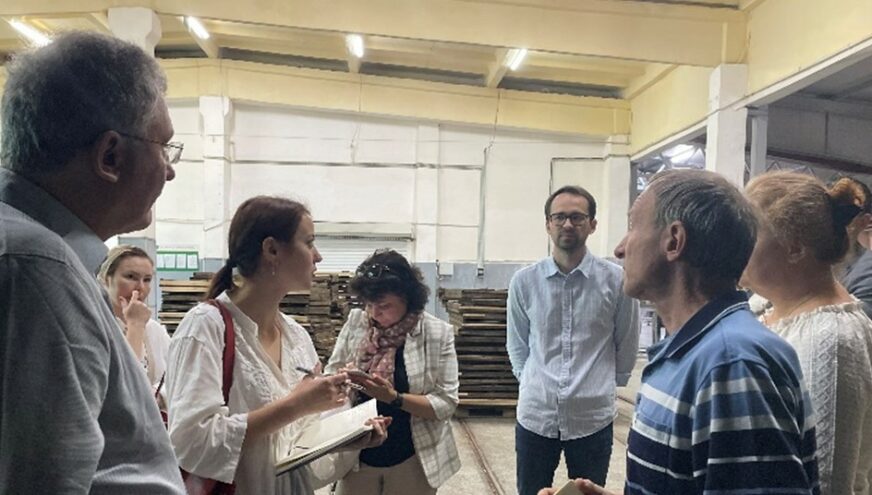
During the visit to Monicol, a walk-through and production assessment were completed by the UNIDO team and company management. Here, several measurements were taken on the production equipment. It was noted that waste is kept to a minimum, as kernels and shells go in the biomass boiler as heating fuel. Noncomplying plums are also used for meshing and distillation. The preliminary calculations completed by the national RECP experts during the walkthrough indicated a dryer efficiency of about 25%. This meant that the efficiency of the dryers could be improved by either installing Variable Speed Drives on the drying fans, by equalizing the airflow profile in the dryers, considering pre-drying as a measure to reduce water intake, by improving the insulation of the tunnels or the tightness of the drying gates, as well as by considering using a heat pump.
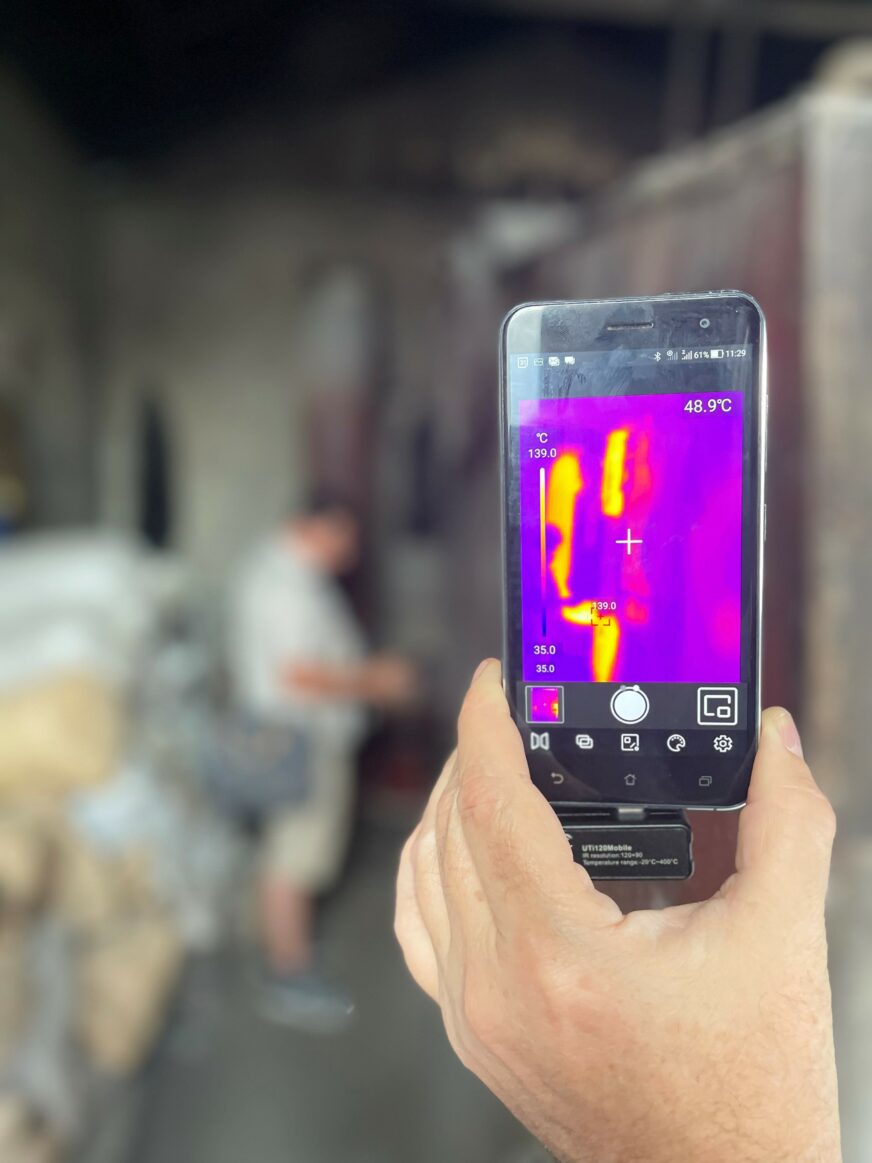
During the walkthrough, a sketch for a heat pump which could replace the hot gas generators was developed by the RECP experts. Alongside it, other proposed measures focused on improving the efficiency of the steam boiler (by automatizing the burning process, and investing in heat recovery). At the end of the walkthrough, the team discussed the potential results and recommendations, and completed a step-by-step RECP assessment report.
Industrial Park Tracom and the success story of Arama R
The series of company visits then continued to Arama R, a company located within Industrial Park (IP) Tracom. Both the Park and Arama R were visited by the UNIDO team on 13 July 2023.
The meeting with the Director General of IP Tracom was useful to follow up on the Park’s transition towards becoming an Eco-Industrial Park. Here, IP Tracom and Free Economic Zone (FEZ) Valkaneș have been designated pilot sites in the EIP feasibility assessment conducted by UNIDO, under EU4Environment. So far, with the support of the Swedish International Development Cooperation Agency and UNIDO, IP Tracom developed a 2030 strategy to become an EIP. Currently, the Park hosts two types of residents (owners of buildings and tenants). For both, the Park management advises on future technologies, and develops strategies in an open public consultation before funding is approved.
One of the most challenging periods was in 2021, when the economy of Moldova shrank drastically, as large amounts of raw materials (and customers) from Belarus and Ukraine were lost. Against the odds, 65% of companies here still have plans to expand. The Park management also held meetings with all owners, where they discussed the security of territory as well as special access points for suppliers and producers. During these times, it was important to observe the strong solidarity between companies, and the close contact of IP Tracom with the Government.
The collaboration of IP Tracom with the UNIDO EIP team was also strong and positive. Based on the provisional EIP feasibility report, the Park was able to initiate several processes (ranging from administration to data processing). In addition, an internal digital mapping of all available networks began. Here, the goal is to further boost urban planning and to seek advice on how to improve the capacities for wastewater treatment.
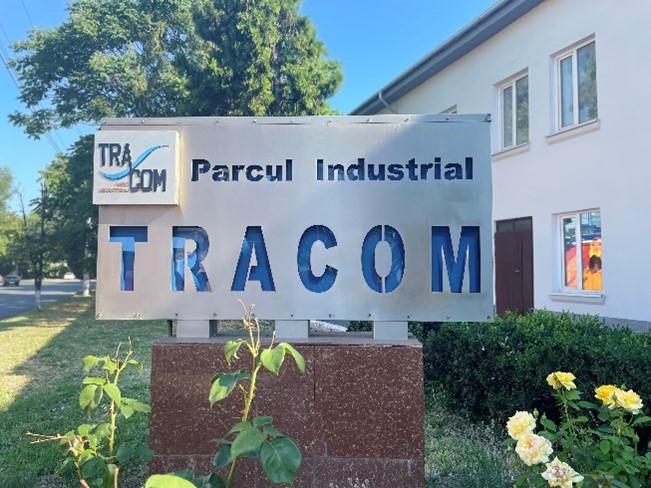
The experience at Monicol was also consonant with the visit performed at “Arama R” SRL. Arama R is a furniture producer located within IP Tracom in Chișinău which carries out the entire production process of furniture, based on the needs and preferences of its customers. This translates into more versatility at all stages of production, as the customers can express their choices when creating the design, overseeing the interior compartmentalization (and choosing the most practical and eco-friendly materials), selecting colours and models, as well as furniture accessories, or any last-minute touch-ups. More than 50% of Arama R’s production goes abroad.
Since 2012, when it moved to IP Tracom, Arama R expanded its capacity from 72 to 7,200 m². While it is using new technologies and modern machinery, its long-term goal is to keep investing in innovative and resource efficient approaches and to continue producing high-quality furniture.
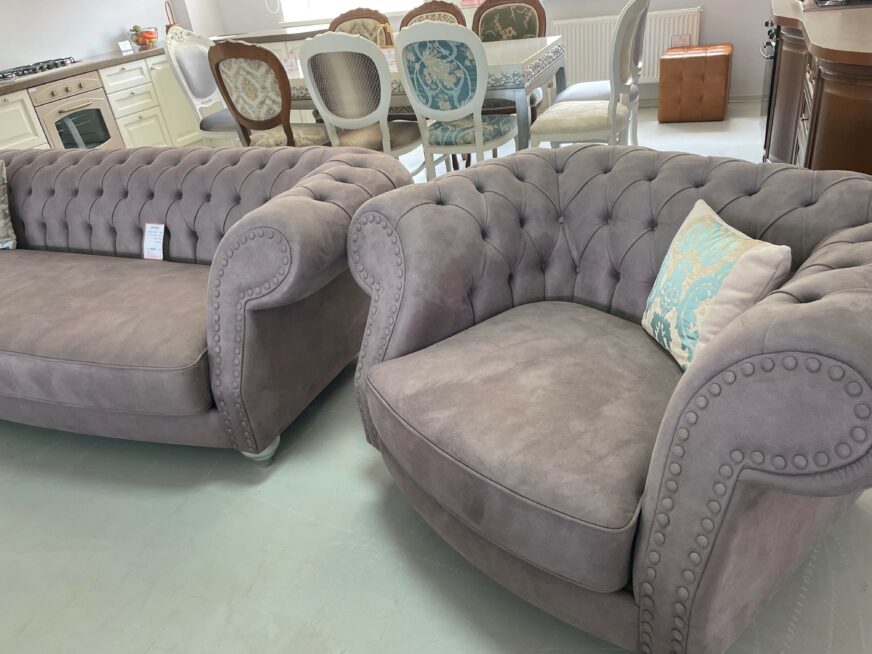
The company has a decade long experience in the field of quality furniture production in Moldova, handling custom-made furniture projects for private individuals (home furniture) as well as legal entities or enterprises (furniture for stores, supermarkets, pharmacies, restaurants, medical offices, company headquarters, banks, etc.). The production profile also extends to a vast level of complexity and detail, based on the required budget or customer quote.
Made-to-order furniture offers the possibility to choose the highest quality accessories, materials, and finishes that include an added comfort, safety, longevity, and unique character. For all custom furniture models, Arama R collaborates with its international partners (such kitchen furniture assembled together with Dupont and Montelli). It produces diverse products, ranging from living room furniture to metal chairs, doors, windows, all the way to hospital furniture. 15% to 20% of the overall production is completed small series, the rest being covered by individual designs. The premium raw materials are imported from Austria and Romania (boards and planks), Ukraine (wood), Italy (paints), or natural stone (South Korea). In the case of board processing, the board is cut according to an optimised pattern, which reuses waste as much as possible. The wood planks are then cut to shape, while the solid wood panels are glued in three layers to guarantee shape and long-term quality. When cutting the board, all designs are computerized and patterns are optimised, with the order being automatically sent to the machines. Cut offs are mostly reused, and whatever cannot be recycled, it is then used in a biomass boiler as heating fuel.
When it comes to paints, the application is performed manually by experienced employees who work with both spray-painting devices as well as traditional brushes in well-ventilated areas. The shades are graded based on the calculated amount. Some of the efficiency approaches used in the painting procedures include low air pressure, and the filtering the paints before application. As per UNIDO Senior Advisor, this should ensure an application efficiency at around 60%.
Earlier this year, Arama R invested into a 370 kWp Photovoltaic (PV) solar panel system, with the grant support provided by the ODA grant on greening SMEs. The suggestion to invest in PV panels was also made by the RECP experts when conducting the RECP company assessment. Throughout the company, it was noted that employee motivation was high, and that every employee understood why it was important, as well as where it was possible to save resources (including electricity).
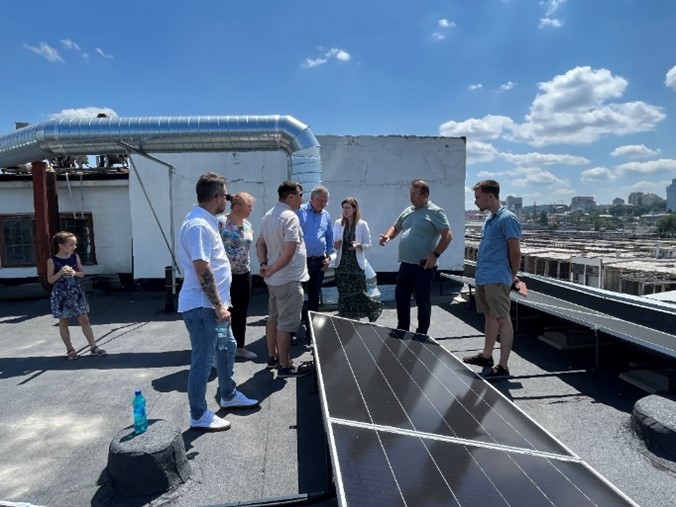
During the company walkthrough used to collect the preliminary observations, the RECP team noted that Arama R was using natural light in combination with LED lights in all its premises (ensuring optimal visibility and an efficient electricity consumption). Recently, the company acquired a laser welding equipment and stone cutting equipment to further improve production and is currently working on a sedimentation plant to recycle its water. Some of the potential RECP measures identified during the visit included: the collection of wood waste for a week to describe the actual quantity of wood waste used in the boilers; overspray and the need to calculate painting efficiency; means to regularly check the compressed air system for leaks; or to consider recycling the PU foam from cut-offs. Other RECP suggestions could include the installation of a speed frequency dimmer on the fan used to ventilate the factory, or the installation of the gasification hot water boiler (based on wood wastes) with a power of 80 kW. Altogether, these suggestions could be perceived as small changes, but have the capacity to yield solid wins.
